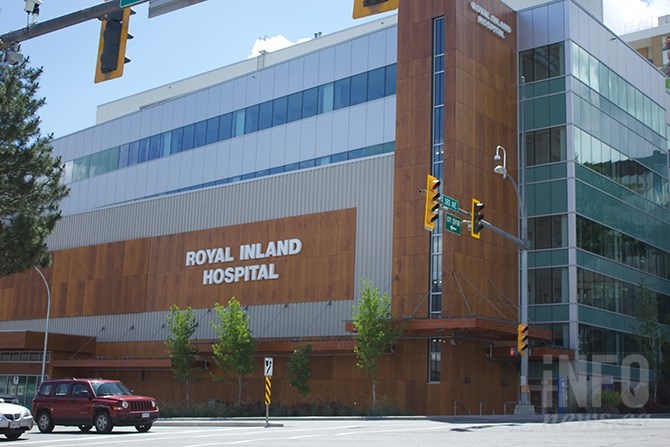
Royal Inland Hospital.
(ASHLEY LEGASSIC - REPORTER / iNFOnews.ca)
August 24, 2018 - 6:00 PM
For people living in a rural community, seeking health care services can come with challenges. But a new study by the Interior Health Authority's research department is looking to change that.
It's called the There and Back Again study. Interior Health's research department is looking to interview 44 people to share their stories regarding their experience after an individual is discharged from a city hospital and what it's like receiving care when they go back to their remote communities.
Katrina Plamondon is the leader for the research study and she say's they're hoping to not only identify the challenges but also develop impactful solutions.
"These questions really came forward from people working within Interior Health and hearing from patients, and their families," Plamondon says.
The Interior Health Authority covers approximately 215,000 square kilometres and hundreds of communities, Plamondon says, and it's important to look at all the unique challenges people from rural communities face.
"We know that people who live in rural communities stay longer (in hospital) than their urban counterparts for the same (medical) conditions," she says. "So if you lived in Kelowna and had to go to Kelowna General Hospital for something to do with your heart, your stay would be quite a bit shorter than if you lived in William's Lake."
It's something Interior Health is still trying to understand, Plamondon says. But one reason for the longer stays could be health care providers not being aware of the services available in rural communities.
"If I'm a nurse working in Kelowna and I'm caring for a patient that's from a remote community, I may know nothing about that community," she says. "When it comes time to coordinate their care, sometimes people leave the hospital but they still have care needs afterward."
The care doesn't always end at the hospital, Plamondon says.
"The rural resources that are outside of the healthcare system that provide support to people isn't necessarily really well known or part of the coordination system," she says.
And longer stays at hospitals can be costly and emotionally stressful, Plamondon says.
"We know that it's a financial strain, emotional strain and it's not easy for people to be hundreds of kilometres away from their homes," she says. "If we can reduce that length of stay, we think that we can improve the quality of experience and overall well-being for people from rural communities."
Some examples of individuals visiting Royal Inland Hospital in Kamloops from remote communities include patients from the Thompson-Caribou area.
"For Kamloops in particular, there are a number of First Nations communities... these communities make up a large portion of the remote patients who would be seeking services or care at Royal Inland Hospital," Plamondon says.
A significant portion of the research hopes to look at the complexity of issues Indigenous patients face when dealing with healthcare services, Plamondon explains.
"We know that people who are travelling from Indigenous communities, family support on site is really critical, but they don't always have access to resources to support that or the distance of travel is so great that it's not possible," she says. "I think making sure that we pay explicit attention to the ways in which our health care system is working or not for Indigenous people is really part of our obligation as healthcare professionals... we can't take for granted that everybody has exactly the same experience in the health care system."
Plamondon says she's looking forward to speaking with individuals from across the Interior Health spectrum to develop solutions.
"We are really interested in patients, their families experiences and we are also really interested in care providers, so right now we are just recruiting," she says. "We are hoping to get a very broad representation of perspectives from across our geography and we really hope to have a strong representation of Indigenous voices as well."
Those interested in participating can go here for more information and the criteria needed in order to participate in the study and questions can be emailed to research@interiorhealth.ca.
To contact a reporter for this story, email Karen Edwards or call (250) 819-3723 or email the editor. You can also submit photos, videos or news tips to the newsroom and be entered to win a monthly prize draw.
We welcome your comments and opinions on our stories but play nice. We won't censor or delete comments unless they contain off-topic statements or links, unnecessary vulgarity, false facts, spam or obviously fake profiles. If you have any concerns about what you see in comments, email the edit
News from © iNFOnews, 2018